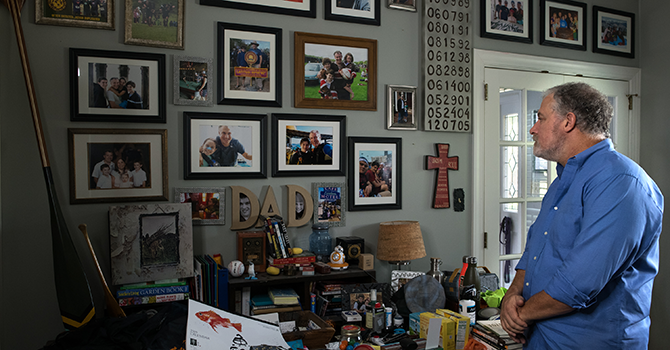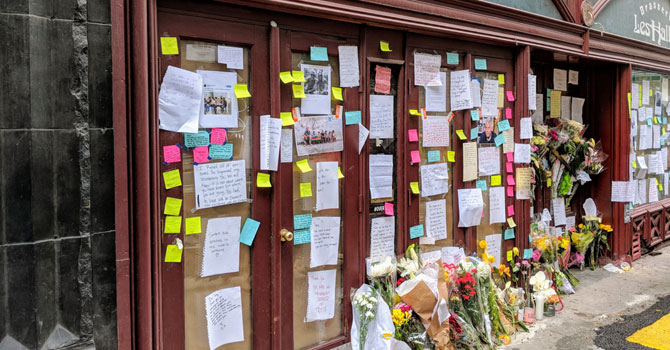When their teenage son Nathan took his own life, Jon and Sarah Kocmond’s pain was too heavy to bear alone. So they turned to the place where they knew they would be comforted and heard: Christ Episcopal Church in Charlotte, North Carolina -- and, eventually, its Survivors of Suicide (SOS) group.
“If we need love to overcome sorrow, what greater source than God?” Jon Kocmond said. “The thing that has sustained me is my faith. I’ve become closer to God and the Holy Spirit. The act of sharing stories with others, sharing grief with others, is therapeutic.”
The support group was formed after the congregation was rocked by a half-dozen suicides within five years -- a series of traumas that affected nearly everyone at the church, the largest Episcopal congregation in North Carolina.
The experience helped spur the congregation to make mental health a top priority, inspired by Jesus’ words in the Gospel of John to a man who had been ill for 38 years: “Do you want to be made well?” (John 5:6 NRSV).
In addition to the SOS group, the church has invested in mental health support and awareness in a number of ways.
It has helped one member establish a nonprofit residential mental health center and another launch a one-woman crusade to educate people about bipolar disorder. It has hosted two appearances by bestselling author Brené Brown to share her message that asking for help is a sign of strength.
And most significantly, the church has begun a search for a wellness director, a new full-time position that will focus on mental health as part of a holistic understanding of what it means to be well.
While the trend is too new to be reflected in hard numbers, mental health advocates and faith leaders say that a growing number of houses of worship across the nation are ministering to those with mental health challenges. Few have discerned the church’s call to nurture body, soul and mind as dramatically as Christ Church.

According to the National Institute of Mental Health, nearly 1 in 5 U.S. adults has some form of mental illness in a given year, including depression, bipolar disorder, schizophrenia, post-traumatic stress disorder, obsessive-compulsive disorder and phobias.
The poor are hardest hit: according to the U.S. Substance Abuse and Mental Health Services Administration, the rate of adults with serious mental illness is highest among those with family income below the federal poverty line.
That factor generally does not affect Christ Church, whose membership is largely well-to-do. But regardless of one’s affluence or status, no one is immune.
And the church has a responsibility to offer help for those who are suffering, said Warren Kinghorn, a psychiatrist and theologian at Duke University Medical Center and Duke Divinity School, who speaks often to congregations about the church’s responsibility in addressing mental illness.
“God cares about human suffering and calls us to attend to those who suffer,” he said.
‘The silent things’
The roots of Christ Church’s mental health ministry trace back to the 2008 recession. Realizing that many in the congregation were having their lives turned upside down, the church organized a Sunday morning forum called “The Wisdom of Contentment” and invited members to come and share their struggles out loud.
Church leaders were stunned by the outpouring. Parishioners rose to tell their stories, not just about financial woes, but about their spiritual and emotional well-being -- or lack of it.
“It made our pain so public, and so widely shared,” said the Rev. Chip Edens, the rector of the 6,400-member church. “It defrosted us. It opened us up more deeply to the struggles of our members.”
The Rev. Chip Edens said that a church forum “opened us up more deeply.” Are there actions your congregation could take to help people open up and connect more deeply?
The Rev. Lisa Saunders, an associate rector, was struck by how eager people were -- and are -- to express out loud the most difficult issues in their lives. “It made us realize the impact of sharing our stories,” she said. “It made this big place seem warmer and more caring.”
The focus expanded from that first gathering, as the congregation and clergy began to see the role of the church as a safe place for parishioners to share what Saunders calls “the silent things.”

As the congregation’s awareness of mental health needs grew, Saunders said, so did their support of programs, preaching and teaching on wellness.
Besides offering people opportunities to share their life challenges, Christ Church seeks to equip them with information and resources, to direct them toward help, and to encourage them not to suffer in silence.
While the initiatives are focused on the congregation, the community is welcome to attend the classes and programs. No one is turned away.
The question posed in the Gospel of John -- “Do you want to be made well?” -- is applied broadly in this setting. Edens said the ministry isn’t based on the belief that Jesus alone can heal what ails us. God, he notes, works through many means, including health care, exercise, meditation and more.
“Jesus wants to renew our minds,” Saunders said.
‘What greater source than God?’
Despite its growing support of mental health, the congregation was shocked by the rash of suicides. Among the dead was a 20-year-old college student, a 51-year-old businessman and father of two who was active in the church, and the Kocmonds’ son Nathan.
According to the Centers for Disease Control and Prevention, the U.S. suicide rate was 14 per 100,000 -- 47,000 deaths -- in 2017, the year Nathan Kocmond died.
Christ Church was moved to act. In 2019, the church created the SOS group, which meets twice a month for an hour and a half, longer if necessary. Saunders helps guide the conversation. The half-dozen families involved politely declined a reporter’s request to sit in, asking for privacy.
But over coffee one Saturday afternoon, Jon Kocmond, a pediatrician, talked about SOS, and about his son.
Nathan Kocmond, 16, died by suicide Oct. 9, 2017. He left home on a Monday and did not return. His body was discovered the following Friday, about a 90-minute drive from Charlotte. He left no note, nor did he share any warnings on social media.
A junior at Providence Day School, he was an excellent student, a football player and a Boy Scout. His father said that Nathan, the middle of their three children, made friends easily.

But as Jon Kocmond characterizes it, multiple factors seem to have played a part in the tragedy. Eight months before his death, Nathan started showing signs of distress. He ran away briefly, and was having thoughts -- though not suicidal -- that disturbed his sleep.
Six weeks before his death, he suffered a football-related concussion, which caused daily headaches. He had to step away from football, and he missed three weeks of school, further fraying his social network.
Jon and Sarah Kocmond try not to blame any one person or factor. “We were all a part of his world,” Jon Kocmond said. “And his world failed him.”
How could you or others in your organization offer spaces for community and love for those suffering from mental illness, or their families and friends?
In SOS, Jon Kocmond talks about Nathan. He listens intently to others who have lost a child, spouse or other loved one. His wife, Sarah, attends, but not as often as he does.
The group discusses the importance of recovering at your own pace, he said, and of not blaming yourself or feeling shame. And the importance of heeding the advice that Edens and his wife gave Kocmond: “You can’t do this without community and love.”

‘We belong to each other’
Kinghorn, of Duke, can cite any number of passages from the Old and New Testaments about God hearing those who cry out in the night.
“Jesus knew what it was to have people say, ‘You’re crazy,’” he said.
From the beginning, the church has raised the question of how we relate to each other, Kinghorn said. In the 1700s and early 1800s, Quakers opened rural “retreats” for the mentally ill -- forerunners of psychiatric hospitals.
Psalm 13:2 asks, “How long must I bear pain in my soul?” -- a challenge that individual congregations have an obligation to answer, Kinghorn said.
When he speaks at churches, Kinghorn offers suggestions to put this principle into practice: Preach about mental health from the pulpit. Organize support groups. Offer classes to help people learn the warning signs. Offer information on where to find help -- through pamphlets in book racks, for example, or a page on the church website. Host forums for people to tell their stories aloud. Call people with mental illness into positions of leadership and service. Sponsor direct treatment.
Are you called to help those with mental illness? Are you willing and able to take the kinds of steps Kinghorn suggests?
But he also notes that there’s a difference between being included and truly belonging. He urges congregations to ask themselves whether they truly welcome the mentally ill into the life of the church and let them know they have a place in God’s home.
Kinghorn said he is moved by Christ Church taking the step, unusual among congregations, of creating a suicide support group.
While Scripture, he said, does not affirm suicide -- our lives are God’s and not ours to take -- neither does it condemn those who take their own lives. Nothing can separate us from the love of God, he said; there is grace and hope for those who die from suicide.
And yet, as St. Thomas Aquinas taught, suicide leaves lasting scars in communities. “We belong to each other,” Kinghorn said.
Life matters
Coping with suicide hasn’t been the only struggle for parishioners. Personal experience with mental illness has prompted two church members to action.
Parishioner Beth Purdy spoke publicly for the first time at a Sunday morning forum in 2008 about her decades-long struggle with bipolar disorder, panic attacks, depression and misdiagnoses.
Purdy and Saunders had feared that few would come to the gathering, called “Life Matters.” But a capacity crowd of 200 turned out.
The experience emboldened Purdy to share her story at churches, mental health seminars -- wherever she could. She launched her ministry as a speaker and advocate for mental health at Christ Church.
Beth Purdy and Bill Blue have been supported by the church as they’ve reached out to help others. Do you have members, staff and clients who could use support, both to help them and to help others?
Purdy believes that by speaking out about her experience, she emboldens others to come out of the shadows.
Thinking back to that turning-point Sunday at Christ Church, she recalls that people seemed relieved to share their stories. “It was like a huge pressure valve was released and people could breathe when talking about mental illness,” she said.
‘It’s courage’
Faced with a family mental health emergency and finding nowhere to turn, Bill Blue retired early from Wells Fargo. With his wife, Betsy, he established HopeWay, a nonprofit residential mental health facility that they opened in 2016. It was unveiled at a Sunday morning forum at Christ Church, the Blues’ parish for 34 years.
Today, the church refers families to HopeWay, and the facility’s medical staff has spoken at the church. The congregation has supported HopeWay financially, Blue said -- including a grant to bring in Theo, a therapy dog.
Extending its reach beyond its campus, HopeWay has hosted communitywide programs in uptown Charlotte featuring nationally known speakers -- among them, ABC News anchor Dan Harris, who has written and spoken about mindfulness and meditation since suffering a panic attack on live TV.
Bill Blue praises his church’s commitment to shatter stereotypes around mental illness. “It’s courage,” he said.

‘What does it mean to live together?’
Perhaps the biggest step that Christ Church has taken is to create the new staff position of wellness director. The vestry, the lay leadership body, agreed to fund the full-time position in January 2019.
The ad for the position ends with these words from Romans 12:2 (NIV): “Do not conform to the pattern of this world, but be transformed by the renewing of your mind. Then you will be able to test and approve what God’s will is -- his good, pleasing and perfect will.”
The first wellness director, when he or she is hired, will serve as an advocate, educator and navigator for the congregation.
Not every congregation can afford a full-time wellness director. Are there less costly ways your organization could commit to a "ministry of presence"?
The position calls for training and credentials in psychology, social work, counseling or psychiatric nursing, but rather than providing treatment, the director will triage parishioners to the right places for help. In addition to being on the church campus at least two Sundays a month, he or she will be available to respond to crises at any time.
Church leaders describe the new position as a ministry of presence, charged with addressing the array of issues that contribute to a person’s health -- mental and otherwise.
It’s one answer to the question that Kinghorn asks congregations everywhere he goes: “What does it mean to live together as a community of people, committed to the glory of God?”
Questions to consider
Questions to consider
- The Rev. Chip Edens said that a church forum “opened us up more deeply.” Are there actions your congregation could take to help people open up and connect more deeply?
- How could you or others in your organization offer spaces for community and love for those suffering from mental illness, or their families and friends?
- Are you called to help those with mental illness? Are you willing and able to take the kinds of steps Kinghorn suggests?
- Beth Purdy and Bill Blue have been supported by the church as they’ve reached out to help others. Do you have members, staff and clients who could use support, both to help them and to help others?
- Not every congregation can afford a full-time wellness director. Are there less costly ways your organization could commit to a “ministry of presence”?
Teaching Tools
Resources on mental health
- National Suicide Prevention Lifeline: 1-800-273-8255
- American Foundation for Suicide Prevention, Washington, D.C.
- Christ Episcopal Church, Charlotte, North Carolina: Mental health initiatives
- First Presbyterian Church, San Antonio, Texas: Pathways to Hope Conference on mental health, Aug. 23-24
- National Alliance on Mental Illness: Interfaith resource network FaithNet
- NAMI offers Spanish translation. To learn about mental health and the African American community, visit www.nami.org/Get-Involved/Awareness-Event





















